Gäste
2017
Joseph David (Mai - Juni 2017)
Research Interests
Belonging, law and religion, religious legal traditions
I was very pleased, honoured and privileged to be a visitor of the Department of Law & Anthropology at the MPI for Social Anthropology in June 2017.
The opportunity to work at the Institute was very meaningful and contributed greatly to my research. The Institute’s superb facilities and intellectual atmosphere made it a perfect working habitat, and I am very thankful for that.
Over the past several years I have followed with great interest the Institute’s ongoing projects. As an outside observer to the fields of sociology and anthropology, I am both fascinated and inspired by the impact of the activities of the Department and especially of its international workshops, which usually take place in June. These annual meetings, in my view, are much more than occasional opportunities to exchange views and examine together pre-defined themes; they represent, rather, stages in a continuing discourse that engages a growing community of scholars that share similar concerns and interests and accelerates the creative work going on in the field of law and anthropology.
I am indebted to Prof. Marie-Claire Foblets for enabling my visit to the Department and inviting me to take part in the workshop on ‘(Re)designing Justice for Plural Societies’. I am also very grateful to the Department’s administrative staff, especially to Ms. Ute Gradmann and Ms. Katerina Marencakova, for the royal treatment I received.
2016
Mônica Gusmão (Oktober 2016 – März 2017)
Research Interests
Legal anthropology, cultural diversity, moral anthropology, dialectical philosophy, human rights.
Research Areas
Brazil, Germany, Portugal
My first extended stay at the Max Planck Institute occurred from August to November 2010 at the invitation of Professors Franz and Keebet von Benda-Beckmann. That visit was very instrumental in helping me shape and complete my doctoral thesis, and I am grateful to the Benda-Beckmanns for the opportunity. My most recent visit took place from October 2016 to March 2017. That visit was related to my post-doctoral research project, titled ‘Judgments of adolescents and juveniles in Brazil and Germany: subjectivities and social characteristics in the biographies of judges’, which investigates judgments pertaining to adolescents and juveniles in juvenile courts in Brazil and Germany through the lens of judges’ biographies. It connects the judges’ life histories with their corresponding legal decisions in juvenile courts, and their perception of their own subjectivity, moral measures and legal sensibilities that inform their decision-making, especially in the face of cultural diversity.
My visit to MPI allowed me to achieve a number of important goals: the Department of Law & Anthropology facilitated exchanges with many researchers who work on similar themes; the MPI library contains exactly the material I needed for my research; and I received excellent help and input through the exchange of ideas in workshops, seminars, retreats, etc. In addition, during my time in Halle I was able to establish important contacts with members of the Law Faculty at the Martin Luther University in Halle-Wittenburg, which will be of great importance for future visits as I continue to pursue my research. While in Halle I stayed in the MPI’s Guesthouse and was generously provided an office in the Department of Law & Anthropology, where I had the full support of the MPI team, most notably Prof. Foblets, who kindly gave me valuable tips, suggestions and feedback.
Kyriaki Topidi (Oktober 2016 – Januar 2017)
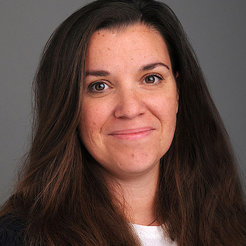
Research Interests
Legal pluralism, religious legal systems, comparative and international law, cultural diversity, education, human rights
Research Areas
United Kingdom, Israel, South Africa
With support from the Swiss National Science Foundation’s Programme on International Mobility, I was able to take advantage of the opportunity to be a guest researcher at the Department of Law & Anthropology from October 2016 through January 2017. While at the MPI, my research focused on aspects of my ongoing habilitation project, Religious Diversity and Legal Empowerment in Public Education: A comparative study on forms of legal pluralism in schools.
During the period of my stay, I benefited from the exceptional facilities and research support provided by the MPI’s librarians and other administrative staff. Like other researchers, my experience was highly conducive to the achievement of focused progress in my project. I was able to advance significantly on a number of pieces of scholarly work. In terms of infrastructure, I was also invited to share an office within the new building of the Department, which further enhanced my experience.
Due to Professor Foblets’s warm academic hospitality and approach to guest scholars, I was included in a variety of ongoing academic activities, including the Department’s write-up and research seminars and the ‘Law After Lunch’ seminars of the Lehrstuhl für Öffentliches Recht, Europarecht und Internationales Wirtschaftsrect of the Martin Luther University Halle–Wittenberg. On all of these occasions, I had the privilege of receiving consistently constructive feedback, whether directly or indirectly, on my work. This helped me appreciate the value of interdisciplinarity in my research area. Prof. Foblets also gave me the opportunity to participate on her behalf in an international conference in Geneva linked to my research topic, which enriched my stay on many levels. In addition, she kindly included me in the Department’s annual retreat in Dresden (January 2017).
For all these reasons, I would recommend the experience without any hesitation to any researcher who wishes to visit the Department. The seamless conditions of academic work that prevail and, at least as importantly, the human factor allowed, in my case, new academic bonds to emerge and older ones to grow stronger. I very much look forward to having the opportunity to return to Halle in the not-so-distant future and benefiting again from the intellectual energy that the Institute provides.
Christa Rautenbach (August - Dezember 2016)

Research Interests
Legal pluralism, customary law, religious legal systems, mixed jurisdictions, constitutional law, and cultural diversity.
Research areas
South Africa, southern Africa, Germany, India, the Netherlands
I received an Alexander von Humboldt Scholarship to spend three months as a guest researcher in the Department of Law & Anthropology, Halle. I am extremely grateful to the Department for partly sponsoring my visit and allowing me to stay an additional two months in the guesthouse of the Institute.
The library is exceptionally well-stocked with materials that assisted me in pursuing my goals for the five-month period. The engagement with fellow researchers was helpful, and important ties were created which should lead to future collaborations.
During my stay I was included in the activities of the department, including the write-up seminars, organized by Brian Donahoe and Bertram Turner, and German language lessons taught by Jutta Turner. I also presented some of my research at the “Law after Lunch” faculty meeting of the “Lehrstuhl für Öffentliches Recht, Europarecht und Internationales Wirtschaftsrect” at the Martin-Luther-University Halle-Wittenberg in Halle (Saale) and at the Department of Law and Anthropology at the Institute.
Halle is centrally located in Germany, with easy access from the local airport to all the major centres in Europe, the United Kingdom and the United States; therefore, I was able to attend quite a number of conferences during my five month stay at the Institute. It also enabled me to fulfil some of my duties as an ambassador scientist of the Alexander von Humboldt Association, in which capacity I attended two meetings, one in Bad Godesberg and one in Berlin.
I will always think back with fondness to the friendly staff of the Institute in the library, the IT Department, and the administrative staff of the Law & Anthropology Department in particular. They were all extremely supportive and helpful in everything, ranging from accommodation to visas, travelling, computer facilities and much more. Specifically, I am indebted to Professor Marie-Claire Foblets for her friendliness and support during my stay. She made me feel welcome and appreciated, and our conversations in Flemish/Afrikaans are memories which will stay with me for a very long time.
I was privileged enough to share a few weeks in the new building, which shows promise of great things to come. I am wishing everyone a fruitful and prosperous time and will keep a lookout for new developments and opportunities for future collaboration.
Jacques Matthee (September 2016 – November 2016)
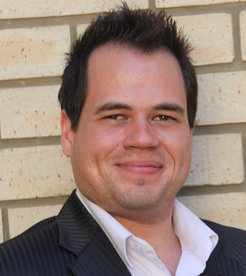
Research Interests
Legal pluralism, African customary law, religious legal systems, cultural diversity, mixed jurisdictions, criminal law.
Research areas
South Africa, southern Africa, Germany, the Netherlands, United Kingdom, Australia, USA
I was fortunate to receive an Alexander von Humboldt Sponsorship for junior researchers through my LLD promoter, Prof. Christa Rautenbach. The sponsorship allowed me to spend three months as a guest researcher in the Department of Law & Anthropology, Halle. I wish to express my utmost gratitude to the Department for the lengths they went to make my stay as productive and comfortable as possible. I was received with so much kindness, and the assistance they provided went beyond anything I expected. I particularly wish to thank the Department for accommodating me in the guesthouse for the duration of my stay.
During my stay I had the privilege of accessing the newly renovated, state of the art library at the Institute. I was very much impressed with the collection of books and journals, as well as the online resources available at the library. The wealth of knowledge available at the library not only contributed to the completion of my research goals for the three months, but also richly enhanced the content thereof.
The Institute also offered me numerous opportunities to engage with fellow researchers on topics of common interest. Not only was I included in the write-up seminars, organized by Brian Donahoe and Bertram Turner, and invited to attend presentations by other scholars working at the Institute, but was also invited to share my own research, together with other researchers, during a session organized by the Department.
I am particularly grateful for the opportunity to have met Prof. Marie-Claire Foblets, whose work and contribution on the ‘cultural defence’ played a pivotal role in the research I conducted for my LLD thesis, titled One person's culture is another person's crime: A cultural defence in South African law? I have no doubt that the ties I established with Prof. Foblets, as well as the other researchers, will lead to future collaboration on research topics of common interest, as well as topics that fall within the research scope of the Department.
The Institute is situated in Halle, which is easily accessible from the local airport in Leipzig. The airport provides easy access to all the major centres in Europe. The location of Halle also makes travel by train to other major cities, both in Germany and neighbouring countries, easy and convenient.
My best wishes accompany any researcher who decides to visit the Institute for a research period. I am convinced that your time here will be as fruitful and prosperous as mine was. I look forward to returning to the Institute and will continue to look for new opportunities for future collaboration.
Tomas Ledvinka (May - October 2016)
Research Interests
Anthropology of law, sociology of law, comity of nations, legal history, legal change in war-torn countries, state formation, political anthropology, cognitive anthropology, multiplicity of legal systems, law and migration, science and technology studies
From May to October 2016 I was a guest researcher in the Department of Law & Anthropology. During that time I was able to concentrate all my efforts on finalizing my dissertation thesis in anthropology (which is based at Charles University in Prague). I was pleasantly surprised by the extraordinarily friendly, cooperative, and open environment in the Department. Clearly this is a place where upcoming legal anthropologists can develop and mature via the mutual exchange of perspectives and fieldwork experiences, as well as the prudent combination of criticism and encouragement offered by the experienced anthropologists and lawyers in the Department. I have never before encountered such extensive feedback on my research presentations as at the Department’s writing-up seminars, as well as in other less formal interactions.
Professor Foblets kindly provided me with all the comforts necessary to allow me to stay focused on my work. One resource of great value is the Institute’s large library, which has a large section dedicated to the anthropology of law and other intersections of law and the social sciences. As social anthropologists are increasingly recognizing that the law is everywhere, even the sections of the library that are dedicated to non-legal issues (e.g., political anthropology, economic anthropology, regional studies) are extremely helpful for understanding law in its various social contexts and cultural settings.
I would like to express my deep gratitude to Prof. Foblets and the Department for those six months that allowed me the opportunity to work peacefully in my office – with a view of the magnificent plane tree in the Institute’s garden – and to immerse myself in anthropology texts at any time, day or night. It was indeed a very happy experience that has contributed significantly to the progress of my research.
Philippe Gout (October 2015–June 2016)

Research Interests
Human rights law, humanitarian law, law of international organizations, transitional justice and alternative dispute resolution mechanisms, legal pluralism, legal anthropology, sociology of law, science and technology studies.
Research areas
Republic of Sudan, Middle East, Sahel and Eastern Africa
I spent nine months as a guest researcher in the Department of Law & Anthropology, where I had an exceptionally constructive experience.
My stay in the Department has proven particularly fruitful for my doctoral research, which is related to transnational legal pluralism in Sudan in the context of international peacebuilding. I mainly investigate the interactions between infra-state customary legal orders and international legal actors, institutions, and norms. The readings that Professor Foblets, senior researchers, and post-doctoral researchers brought to my attention have been fundamental to the structuring of my writing and argumentation. The stay has also given me the opportunity to consult with Professor Richard Rottenburg, the Chair of Anthropology at Martin Luther University, Halle–Wittenberg, and with several researchers affiliated to his research group.
I am very grateful to the Department for the various scientific activities I was able to participate in during my stay. Most notably, I attended the bi-weekly write-up seminars organized by Senior Scientific Editor Brian Donahoe, during which the Department’s PhD students present their respective research and work-in-progress. These seminars provide helpful critical feedback and contribute to the feeling of being part of a comprehensive team. I am also thankful to Professor Foblets, who personally supervised my work during my stay and invited me to participate in the Department’s annual scientific retreat last January (2016) in Wittenberg.
I was impressed by the working conditions at the Institute. The calm and friendly working environment, the remarkable library where I spent most of my time, and the provision of personal office space make working at the Institute a prized and unique experience for PhD students. Last but not least, the staff at the Institute were very supportive and welcoming in all matters.
Elizabeth Steyn (January - April)
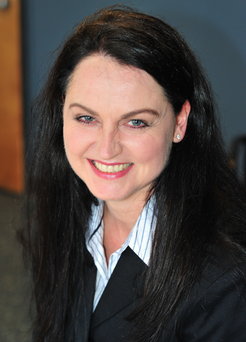
Research Interests
Indigenous rights, natural resource law, international human rights law, minority rights protection, sacred sites, law and religion, comparative law, legal anthropology
Research Areas
Canada, United States, Australia, New Zealand
There is no doubt that the four-month period I spent at the Max Planck Institute for Social Anthropology as Visiting Fellow of the Department of Law and Anthropology counts as one of the richest experiences of my life. It afforded me the opportunity to home in on my doctoral thesis with tremendous focus. In this I benefited from a true team effort: the Institute’s ultra-efficient personnel proactively anticipated any needs, freeing me to concentrate on my work; the senior researchers engaged, challenged and enriched my thinking in a myriad of ways; and Professor Marie-Claire Foblets significantly expanded my horizons.
My visit kicked off with the intensive and constructive departmental retreat in Wittenberg, and I had the occasion to both present my own work and participate in multiple seminars and write-up workshops during my time here. Preparing for the seminars helped me clarify my thinking; interacting with other doctoral and postdoctoral researchers encouraged and inspired me; the write-up workshops served to fine-tune style as well as content. The scholarly atmosphere of the Institute, its well-stocked library and ever-resourceful librarians, and the conveniently situated Guest House next door all translated into very real results: 165 pages of solid writing on my thesis, 5 seminars presented, 2 chapters rendered for write-up workshops, as well as a contribution crafted for a special issue of the journal Rechtsphilosophie’s on Recht und Religion at the instance of Professor Foblets.
My sincere thanks go to Professor Marie-Claire Foblets, Director of the Department of Law and Anthropology and Managing Director of the Institute, as well as my thesis supervisor, Professor Jean-François Gaudreault-DesBiens, Canada Research Chair in North American and Comparative Juridical and Cultural Identities and Dean of the Faculty of Law of Université de Montréal, for making this stay possible.
Elizabeth Steyn
LL.D. Candidate, Faculty of Law, Université de Montréal
Junior Researcher, Centre de recherche en droit public (CRDP), Université de Montréal
Junior Researcher, État et cultures juridiques autochtones: un droit en quête de légitimité / The State and Indigenous Legal Cultures: Law in Search of Legitimacy
Alice Margaria (January)
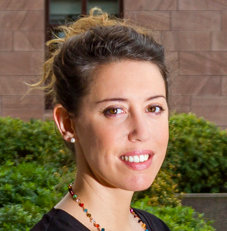
Research interests
Human rights, socio-legal studies, family law, fatherhood, gender studies, masculinities, sociology of law, European court of human rights.
I spent a month (January 2016) as a guest researcher in the Department of Law and Anthropology, where I had an extremely positive experience. I was fortunate to arrive just before the departmental retreat, which I was kindly invited to attend. That occasion presented a wonderful opportunity to become more familiar with the law and anthropology approach and to learn about all the fascinating research projects being conducted at the Institute and by scholars affiliated with the Institute. The retreat was a great experience also from a personal perspective: the MPI community was welcoming, friendly and warm from the very first day.
The MPI is the perfect place to do research and write, thanks to the serenity and peacefulness of the neighbourhood and, more generally, of Halle. Another added value of the MPI is the library, where you can find almost everything you need and which has an incredibly efficient interlibrary loan service. During my stay, I was kindly provided with an apartment in the Institute’s guesthouse. It is very comfortable and convenient, as it is on the premises of the MPI, just a few metres away from the main buildings. Last but not least, I had the privilege of being in close contact with Prof. Foblets. I very much benefited from her insightful feedback on my current research and from the multiple exchanges of ideas I had with her. I wish I could have stayed longer. The MPI is definitely a place I would like to go back to as soon as I can!
Alice Margaria
Post-doctoral Researcher, Fundamental Rights Laboratory (Turin)
Lecturer, Koç University, Law School (Istanbul)
Farrah Raza (October 2015 – February 2016)
Research Interests
Law and religion, constitutional theory, discrimination law, public law and human rights.
Professor Foblets kindly accommodated my request to visit the Max Planck Institute for Social Anthropology from October 2015 until February 2016. I was particularly interested in the Law & Anthropology Department, as its members have produced leading research on legal pluralism, which fits with my PhD research on religious accommodation in European law. My time there was very useful and enjoyable. I carried out some comparative work on how the EU framework Directive 2000/78/EC was implemented in the UK and Germany. Comparing the case law from the UK and Germany proved to be quite an interesting challenge.
I attended the weekly write-up seminars, which were useful for all participants. They provided an occasion to get to know what other people are working on and to discuss their work-in-progress. I had the opportunity to consult with several senior researchers, who provided useful and critical feedback on my work, especially at the annual retreat in Wittenberg. I also attended events and lectures jointly held by the Institute and the Martin Luther University. These lectures were inspiring and offered me an insight into anthropology and anthropological methods.
Overall, the researchers in the Law & Anthropology Department were very friendly and helpful. The staff were also very supportive – I really appreciate their efforts to make my stay comfortable. I enjoyed my time at the MPI and am so grateful for the opportunities it afforded me.
Farrah Raza
PhD Candidate at King's College London, LL.M (Cantab), LL.B.
2015
Tobias Berger (October – December)
Research Interests
International and transnational politics, the anthropology of global institutions, human rights, non-state courts, law and religion, comparative political thought, legal and political anthropology.
Research Areas
South Asia
I spent three months in the Department of Law and Anthropology at the Max Planck Institute for Social Anthropology in Halle (Saale) at the invitation of Prof. Marie-Claire Foblets. During my time in the Department, I was working on a monograph tentatively entitled Experiments in Justice – Translating the Rule of Law in Bangladesh. Based on three successive rounds of field research in Bangladesh between 2011 and 2014, the monograph focuses on transnational influences on rural non-state justice institutions. In particular, it investigates the ways in which both transnational liberal notions of ‘the rule of law’ and local patterns of conflict resolution are transformed in the context of various international donor agency-funded projects involving local village courts.
A second project I was working on while at the Max Planck Institute concerns the anthropology of international organizations. During my time in the Department, I drafted a chapter on ‘Global Village Courts – International Organizations and the Bureaucratization of non-State Justice Institutions in the Global South’. The chapter is forthcoming with Cambridge University Press in a volume edited by Maria Sapignoli and Ronald Niezen, Palaces of Hope – The Anthropology of Global Organizations.
Trained as a political scientist, I greatly benefitted from the vibrant intellectual atmosphere of the Department. The multi-disciplinary exchange it facilitated among anthropologists, legal scholars, and other social scientists, as well as the regular discussions with external visitors in the contexts of colloquia and seminars, were a great source of inspiration. In particular, I benefitted from the regular ‘work in progress’ seminars in the Department of Law and Anthropology, and would like to extend my sincere gratitude to all participants for their insightful and constructive comments. Very special thanks also go to Marie-Claire Foblets for her outstanding academic hospitality, and to all the staff members of the Institute and its Guest House for warmly welcoming me in Halle.
Tobias Berger
Junior Visiting Fellow
Institute for Human Sciences, Vienna, Austria
Shane Chalmers (July – August)
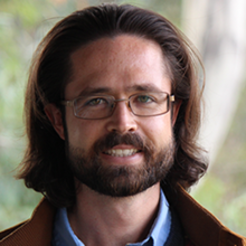
Research Interests
Overarching interest in critical thought on law and society, law and the humanities, dialectical philosophy. Specific research experience in legal philosophy, socio-legal theory, and anthropology of law. Thematic research experience on the rule of law and legal pluralism, human rights, international law, regulation and governance.
The Law and Anthropology Department kindly welcomed me to Halle in July 2015 for a two-month visit. The visit took place at a critical period in my doctoral studies, when I was working on questions of legal pluralism whilst writing a chapter of my thesis on the rule of law in Liberia, based on fieldwork I had completed there in 2013. During my stay I also worked on a related book chapter entitled ‘The Visual Force of Justice in the Making of Liberia’, which will appear in Law and the Visual: Transition, Transformation, and Transmission (Desmond Manderson, ed., University of Toronto Press, 2016). Conversations with members of the Department as well as scholars throughout the Institute contributed in very important ways to this work. The Institute's excellent library also proved a valuable resource for materials on Liberia and on legal anthropology more generally. While most of my time was spent researching and writing in the office generously provided by the Department, I had the opportunity to learn about the Department's diverse range of research projects, especially some very exciting doctoral projects. This was a highlight of the stay – learning about the new research questions and directions being taken in the Department by established and emerging scholars. During this time I also had the opportunity to present my work to the Department and further afield, attending a conference in Hanover hosted by the Marburg Zentrum für Konfliktforschung (Center for Conflict Studies). More frivolously, but no less importantly, the MPI's very warm and friendly community treated me to a wonderful German summer in Halle. I thank everyone in the Department and the Institute for making the visit such a memorable and productive one, and I especially thank Professor Foblets for extending the invitation.
Shane Chalmers
Centre for International Governance & Justice
School of Regulation and Global Governance (RegNet)
The Australian National University
Chiara Quagliariello (June – July)
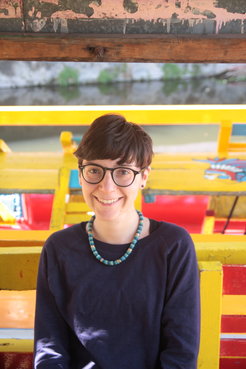
Research Interests
Medical anthropology, reproductive health, childbirth, maternity, migration, social inequalities and right to health.
Research Areas
Western Europe, Western Africa (Senegal)
I was a visiting researcher in the Law & Anthropology Department at the Max Planck Institute for Social Anthropology for a total of seven weeks in June and July 2015. For me this was a wonderful experience. From the beginning I was warmly welcomed by everyone in the Department, and I immediately felt ‘at home’. My office was very calm and quiet, and I had access to all the facilities I needed for my work. In the library I found many new sources for my work, and the library team was very open to all my questions. My fellow colleagues in the Law and Anthropology Department were excellent scholars with whom I had in-depth exchanges regarding our research projects. During my stay I took part in seminars and even had the opportunity to present my work during one of these. The feedback I received from the MPI academic community gave me new input for the development of my ongoing postdoctoral project. Furthermore, I am thankful for the support I received from Professor Foblets. Whenever I needed suggestions or feedback, she was there to provide helpful advice. I can definitely say that my stay at the MPI was very productive: in a bit less than two months I managed to complete two articles based on the findings of my postdoctoral research. I was also invited by Professor Foblets to contribute a chapter for inclusion in a publication on personal autonomy issues. Beyond the academic aspects, my stay at the MPI was very pleasant. The lovely guesthouse where I stayed was just across the garden from my office. There I met some very nice people with whom I continue to maintain friendships to this day.
Chiara Quagliariello
CRESPPA-CSU (CNRS, Paris)
Laboratorio dei Diritti Fondamentali (Turin, Italy)
2014
Jonas Bens (May – June)
Research Interests
Legal anthropology (esp. international criminal law, transitional justice, indigenous rights, international courts, legal theory), political anthropology (esp. indigeneity, ethnicity, collective identity politics, political theory); ethnohistory, history of anthropology / history of science.
Research Areas
East Africa (Uganda); Western Europe (Germany, Netherlands); North America (USA, Canada)
Prof. Marie-Claire Foblets kindly invited me to spend two months as a Visiting Researcher with the Department of Law and Anthropology at the MPI for Social Anthropology in Halle/Saale. I used the time to work on my doctoral project and to write a draft for an MPI Working Paper.
Being trained as a lawyer and an anthropologist, I am interested in exploring the various intersections of the two disciplines. While I was in Halle I received invaluable input on my doctoral project, which examines indigenous rights cases and competing understandings of indigeneity and ethnicity among anthropologists, political actors and lawyers in the Americas. Being able to exchange thoughts and ideas with a large number of experts on the interaction between law and social sciences – post-doctoral fellows as well as doctoral students like myself – allowed me to make great leaps forward in my project. The reciprocal, warm and friendly way that all researchers in the Department work together and conduct their research contributed greatly to what was, for me, a very productive time.
I also began drafting an MPI Working Paper on the topic Applied Legal Anthropology: Advocacy, Expertise and Translation, in which I tried to look deeper into the historical roots of anthropological interventions into the law and the other way around. The excellent resources of the Institute in terms of literature and online catalogues provide an outstanding basis for intensive literature-based research.
The timing of my visit was particularly fortuitous, as I was able to participate in a very productive working retreat of the doctoral researchers in Dresden, a conference titled (Not) Outside My Culture: The paradoxes of personal autonomy in a plural society, hosted by the Department, and a training week on ethnographic methods. All this gave me the opportunity to meet outstanding academics and acquire valuable insights.
I am grateful to Prof. Foblets for her invitation and to all the colleagues in Halle for their warm welcome and inspiring conversations. I am looking forward to future collaboration with the Department.
Jonas Bens
Department of Political and Social Sciences
Institute of Social and Cultural Anthropology
Freie Universität Berlin
Frederike Silvana Nun (April – July)
My three-month internship in the Law and Anthropology Department at the Max Planck Institute for Social Anthropology enabled me to gain new perspectives on norms and legal orders in a wider context. Advancing globalization and the internationalization of law and social and political processes create the necessity of dealing not only with different legal orders, but also with the increasing multiculturalism in societies. The combination of law and anthropology offers a productive approach to understanding legal pluralism, the links between religion and law, different cultural conceptions of norms and mechanisms for the regulation of the daily issues or conflicts, and different understandings of the term law.
During the three months I spent at the MPI I worked on the topic ‘International Actors in the Rule-of-Law Sector in Africa: approaches, agendas and methods’ under the supervision of Dr. Katrin Seidel, Post-Doctoral Researcher in the Law and Anthropology Department. For her supervision and support I am deeply grateful. I furthermore benefitted from the joint Institutes’ Colloquia, the seminars, methods courses and the IMPRS REMEP Summer School, held at the MPI in Halle. The invited speakers from different disciplinary backgrounds set the stage for interdisciplinary discussions and proved to me the benefit of exchange between disciplines to obtain multifaceted perspectives on an issue.
The MPI provides an extraordinary research environment and ideal work conditions not only because of the amazing collection of books in the Institute’s library and electronic access to thousands of journals and documents, but also because of the kind and open atmosphere.
I want to thank sincerely Prof. Dr. Foblets, the head of the Law and Anthropology Department and one of the directors of the MPI for Social Anthropology for the wonderful opportunity of an Internship, the opportunity to participate in the conference ‘(Not) Outside My Culture: The paradoxes of personal autonomy in a plural society’ and at meetings organized by the Department, and especially for the encouraging conversations we had about my future studies.
2013
Gerhard Anders (September – December)
Prof. Dr. Marie-Claire Foblets kindly hosted me at the Law and Anthropology Department during my sabbatical leave between September and December 2013. The Department is at the cutting edge of legal anthropology in Europe, and I was happy to contribute to the workshop Negotiating Normative Spaces: Insights from and into African Judicial Encounters (7–8 November 2013) and the conference Teaching Legal Anthropology: Aims and Constraints in a Changing Academic Climate in Europe (27–28 November 2013). Both events proved to be stimulating and inspiring experiences, exploring crucial dimensions of research and teaching in current legal anthropology. Trained both in law and anthropology and keen to explore possibilities for inter-disciplinary dialogue, I appreciated the opportunity to give a presentation on international criminal justice in Africa in the Law after Lunch series organized by the Law Faculty at the Martin-Luther University, Halle/Saale (17 December 2013).
Besides being part of these and other events at the Max Planck Institute, I was grateful to be provided the space to focus on writing. In my short time at the MPI I managed to finish three articles and a special issue of the journal Development and Change (co-edited with Olaf Zenker) titled Transition and Justice: Negotiating the Terms of New Beginnings in Africa (45[3], May 2014). I am looking forward to collaborating further with the Law and Anthropology Department in Halle.
Gerhard Anders
School of Social and Political Science
University of Edinburgh
2012
Patricia Urteaga-Crovetto (March – May)
My 3-months stay at the Max Planck Institute allowed me to examine how local water rights are continuously transformed in conflictive settings. In my paper I explore how indigenous water movements in Peru have reshaped local understandings of water rights in the midst of complex water and environmental conflicts with mining, hydrocarbon and agribusiness industries. I look at three settings in the Andes and the Amazon basin to elucidate how local content of water rights 'greens' as local people face the threats and impacts of extractive industries.
I am grateful to Profs Franz and Keebet von Benda-Beckmann, former heads of the Project Group Legal Pluralism, now the Department of Law & Anthropology, for having invited me to work on these issues. The MPI is an excellent environment to do research. While at the MPI, I was able to use the library online catalogue and the electronic sources to improve my work. The resources at hand are indispensable to carrying on academic work, and they worked really well for me.
I benefitted particularly from the work done by Profs Franz and Keebet von Benda-Beckmann and the legal pluralism group, as they have dealt extensively with water issues worldwide, especially in Asia. Their work on water rights was particularly enlightening for me, as it unravels the multiple dimensions of water dynamics and the way they shape water rights themselves. This enabled me to know the literature, compare it and draw parallels with my own ethnographic findings in Latin America. I also thank Prof. Marie-Claire Foblets, current director of the Department of Law & Anthropology, for her interest and exchanges regarding our research.
The location of the MPI is also an asset. As I have two children, it was very comfortable to work close to the guest house. In addition, the history and beauty of the city of Halle makes a critical difference in the opportunities available to researchers to appreciate art and enjoy a pleasant and inspiring stay while simultaneously working.
Armando Guevara-Gil (March – May)
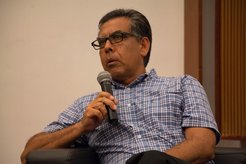
Research Interests
Anthropology of law, indigenous and peasant water rights, Spanish colonial water law in the Andes, law and development, cultural expert witness, legal pluralism.
Research Area
Latin America, Andean countries, Peru
This is a brief report on my activities as a Guest Researcher of the Legal Pluralism Group of the Max Planck Institute for Social Anthropology in Halle (March-May 2012). In my first meeting with Professors Franz and Keebet von Benda-Beckmann we agreed that I was going to work on two papers in order to submit them for publication in the Working Paper Series of the Institute.
The first paper is entitled, provisionally, "The grey side of Project Law: local autonomy and illegal practices in a water development project in the Peruvian highlands". In this case, a small water user association worked jointly with a development agent to improve its main canal. I analyze the implementation of the project, the set-up of the specific Project Law, and how it was skilfully negotiated by the WUA so that, instead of weakening it, it ended up strengthening its autonomy.
The second one is "The contractual character of local water law: the case of the Irrigators' Committee of Santa Rosa de Ocopa (Junin, Peru)". Here I study how law is embedded in the social interactions that farmers, ditch tenders and board directors carry out for managing water flows. In this setting, State, and even local water law, is not enforceable. It can only be flexibly enacted through negotiations and particularistic arrangements.
After spending these short months in Halle, I can now report that I have made great progress in writing both papers. The first one has been reviewed by Franz and Keebet. The valuable comments and critiques I have received from them will help me prepare the final draft. The second paper has been presented at the Symposium in Honor of David H. Getches, organized by the University of Colorado Law School at Boulder (April 26-27). During my last weeks in Halle I was editing this draft before sending it to Franz and Keebet for their evaluation. After receiving their feedback I will prepare the final version that I will submit to the Working Paper Series Board.
I have to thank Franz and Keebet for their generous invitations to come as a Guest Researcher of the ISA-MPI, jointly with my wife, also a Guest Researcher, and two children. This has been a once in a life-time opportunity and I have certainly taken advantage of it. Being able to engage with Franz and Keebet, other Guest Researchers and young doctoral candidates, as well as attending some seminars, has been quite a learning experience and a fruitful opportunity. Having access to the library has been a delightful and illuminating experience. Linving in the guest house has been convenient and warm. Finally, I wish to tank Marie-Claire Foblets, the director of the new Department of Law & Anthropology, for her interest in my work. I am sure she will successfully follow and expand the path opened by Franz and Keebet.
Armando Guevara-Gil
Pontificia Universidad Catolica del Peru








